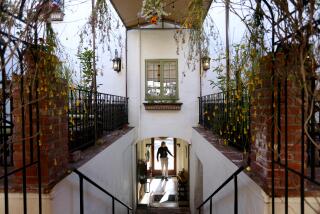Judge Halts City’s Bid for Church Land
- Share via
In a stinging 36-page opinion, a federal judge Tuesday ordered a temporary halt to the city of Cypress’ plan to condemn church property in order to make way for a tax-generating Costco.
“The framers of the Constitution ... might be surprised to learn that the power of eminent domain was being used to turn the property over to a private discount retail corporation,” U.S. District Court Judge David O. Carter wrote.
The ruling in favor of Cottonwood Christian Center’s request for a preliminary injunction is the first peek at the judge’s leanings in a national test case that weighs a city’s redevelopment rights against a church’s free exercise of religion.
In issuing the injunction, the judge said the 4,000-member megachurch has demonstrated a “likelihood of success” in its lawsuit, filed in January, against the city. He concluded that both major prongs of the church’s legal argument had merit: that the city lacked a “compelling state interest” to condemn Cottonwood’s 18 acres of vacant property near the Los Alamitos Race Course for a private interest, and that the city had infringed on the church’s freedom of religion.
“Even if [the city] had compelling reasons to burden Cottonwood’s religious exercise, they must do so in the least restrictive means,” Carter said. “Far from doing that, the city has done the equivalent of using a sledgehammer to kill an ant.”
City officials downplayed the significance of the judge’s order, saying they already have voluntarily suspended condemnation proceedings while trying to work out a land swap with Cottonwood. They also said the issues will be raised again when the church’s lawsuit against the city goes to trial, which is scheduled for March.
“What this does is perpetuate the status quo,” City Atty. William Wynder said. “The next step is getting this case to trial.”
But Cottonwood attorney Kevin J. Hasson said the ruling will have far-reaching implications.
“In the bigger picture, this sends a signal across the nation that it’s not right to take a church’s property,” said Hasson, president of the Becket Fund for Religious Liberty, a Washington-based group that concentrates on religious freedom.
The two sides have been fighting for nearly two years over property at the corner of Walker Street and Katella Avenue, the busiest intersection in the city’s 300-acre redevelopment zone.
Cottonwood officials, seeking a new home for the expanding congregation in neighboring Los Alamitos, paid $13 million for the land in 1999. In October 2000, city officials rejected the church’s plans for the site, indicating they preferred office towers. More recently, they decided they wanted a Costco on the lot.
Cottonwood filed a federal suit in January, accusing the city of discriminatory practices for stopping the church’s plans in favor of businesses that would provide the city with tax dollars. In May, the church sought a temporary injunction in federal court after the City Council unanimously voted to condemn the church’s land.
On Tuesday, Carter said he found Cypress’ stated reasons for taking the action--eliminating blight and generating tax revenue--dubious.
“At first blush, the city’s concern about blighting rings hollow,” Carter said, asking why the city didn’t clean up the property for more than a decade if this were the case. “Although some innocent explanations are feasible--such as new leadership or robust economic growth--the activity suggests that the city was simply trying to keep Cottonwood out of the city, or at least from the use of its own land.”
He also called the city’s revenue concerns “even more suspect than the concerns of blight,” adding that Cypress has a 25% budget surplus.
Carter’s ruling pleased advocates of religious freedom, especially for his citing of a religious land use act passed by Congress in 2000 to criticize the city’s decision to seize the land. Also heartened were constitutional conservatives who believe local government has become too bold in taking private property to boost revenue.
“This ruling is big because it continues a major trend of courts starting to refuse to rubber-stamp redevelopment confiscations,” said Harold E. Johnson, an attorney with the Sacramento-based Pacific Legal Foundation, a public interest firm that specializes in property and individual rights. “When government’s motive is merely to transfer land to a favored developer or to fatten the government’s coffers, a condemnation action doesn’t cut it constitutionally.”
Douglas Laycock, a University of Texas law professor who specializes in religious freedom, said: “This is pretty significant because two constitutional issues are at stake: freedom of religion and the proper use of eminent domain. There haven’t been that many cases like this and that’s led to a widespread attitude with government officials who believe churches exist [only with] their permission.”
Cypress Councilman Tim Keenan said city officials haven’t received credit for agreeing to “a major concession. We are willing to take the church into our community and we are willing to take more than 18 acres off our tax rolls.”
He also vowed to seek an out-of-court solution with Cottonwood, the most promising being a land exchange involving property near the Los Alamitos racetrack.
“I’m disappointed, clearly,” Keenan said. “The judge worked hard, but I don’t think he got it. But we’re committed to a negotiated settlement, and I hope the church doesn’t use this for political gain.”
John Shirey, executive director of the California Redevelopment Assn. in Sacramento, said the case is unique because a church is involved and likely won’t affect many redevelopment decisions.
“What should not be lost here is the impetus behind this whole effort: local governments in this state trying to sustain themselves and ... meet the unending demands of their citizens,” he said.
More to Read
Sign up for Essential California
The most important California stories and recommendations in your inbox every morning.
You may occasionally receive promotional content from the Los Angeles Times.










